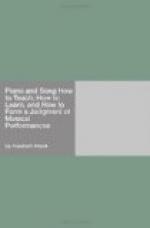At the same time, I have in every way cultivated the sense of time, and taught the division of the bars. I have helped the pupils to invent little cadences with the dominant and sub-dominant and even little exercises, to their great delight and advantage; and I have, of course, at the same time insisted on the use of the correct fingering. You see that, in order to become practical, I begin with the theory. So, for instance, I teach the pupil to find the triad and the dominant chord of the seventh, with their transpositions in every key, and to practise them diligently; and to make use of these chords in all sorts of new figures and passages. But all this must be done without haste, and without tiring the pupil too much with one thing, or wearing out the interest, which is all-important.
After that, I teach them to play fifty or sixty little pieces, which I have written for this purpose. They are short, rhythmically balanced, agreeable, and striking to the ear, and aim to develop gradually an increased mechanical skill. I require them to be learned by heart, and often to be transposed into other keys; in which way the memory, which is indispensable for piano playing, is unconsciously greatly increased. They must be learned perfectly and played well, often, according to the capacity of the pupil, even finely; in strict time (counting aloud is seldom necessary) and without stumbling or hesitating; first slowly, then fast, faster, slow again, staccato, legato, piano, forte, crescendo, diminuendo, &c. This mode of instruction I find always successful; but I do not put the cart before the horse, and, without previous technical instruction, begin my piano lessons with the extremely difficult acquirement of the treble and bass notes. In a word, I have striven, as a psychologist and thinker, as a man and teacher, for a many-sided culture. I have also paid great attention to the art of singing, as a necessary foundation for piano-playing. I have devoted some talent, and at least an enthusiastic, unwearied love to the subject. I have never stood still; have learned something of teaching every day, and have sought always to improve myself; I have always been something new and different, in every lesson and with every child; I have always kept up a cheerful, joyous courage, and this has usually kindled the same in my pupil, because it came from the heart. Moreover, I have never been a man of routine, have never shown myself a pedant, who is obliged to hold fast to certain ideas and views.
I have lived up to the century, and have tried to understand and to advance the age; have heard every thing great and fine in music, and have induced my pupils also to hear it. I have opposed with determination all the prejudices and false tendencies of the times, and never have allowed impatient parents to give advice about my lessons. I have insisted upon a good and well-tuned instrument for my pupils, and have endeavored to merit the love and confidence both of my pupils and of their parents. In fact, I have devoted myself thoroughly to my calling, and have been wholly a teacher, always fixing my eye on the true, the beautiful, and the artistic; and in this way have been of service to my pupils.




